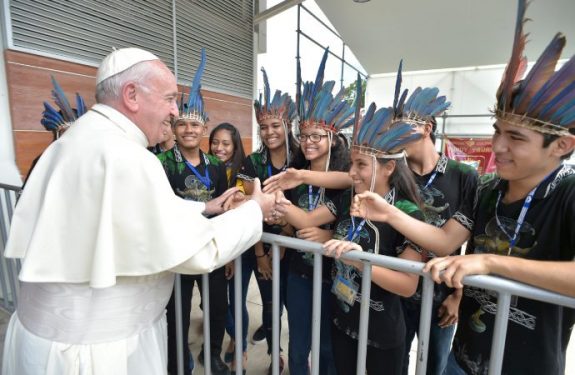By Inés San Martín, Special to The Tablet

PUERTO MALDONADO, Peru – In the middle of the Peruvian jungle, where children are prostituted in bars in broad daylight and women sold to modern-day slave owners, Pope Francis laid out what amounts to a papal version of the #MeToo movement on Friday, decrying violence against women and sexual exploitation.
“Violence against women cannot be treated as ‘normal’, maintaining a culture of machismo blind to the leading role that women play in our communities,” Francis said.
“Machismo” is a word widely used in Latin America to refer to chauvinistic attitudes towards women, as well as a broader dismissal of women’s voices and experiences.
Francis has long been an advocate against human trafficking and modern-day slavery, which he’s described as a “crime against humanity.” According to the Global Slavery Index, Haiti has more people enslaved today than in 1804, when the practice was officially abolished following the country’s Slave Rebellion.
Globally, an estimated 35 million people are victims of human trafficking, and some 70,000 are in Peru. Some estimate the illegal industry has become the most lucrative of them all, surpassing gun trafficking and drug dealing.
Experts say the Amazon jungle has become a leading hub for traffickers, who can hide in the jungle and use it as a route to move their victims. Madre de Dios, the region Francis is visiting Friday, is widely considered the most forgotten region in the country, with traffickers able to exploit several routes there with impunity.
Outside of Lima, this region contains the largest number of Peru’s slaves, 30 percent of whom are reportedly forced to prostitute themselves.
According to the pontiff, the world has become accustomed to using the term “human trafficking,” when in reality what’s going on is slavery: “Slavery for work, sexual slavery, slavery for profit.”
“It is painful to see how in this land, which is under the protection of the Mother of God, so many women are devalued, denigrated and exposed to endless violence,” the pope said.
Looking the other way and allowing the dignity of women, most still very young, to be trampled upon is not acceptable, he added.
Francis then reflected on what he described as many Peruvians who abandoned “poor, yet worthy lives” because they were drawn by the siren-like idea of gold mining. This dazzling metal, he said, can become a “false god that demands human sacrifices.”
“False gods, the idols of avarice, money and power, corrupt everything,” Francis told the crowd. “They corrupt people and institutions, and they ruin the forest. Jesus said that there are demons that require much prayer to expel. This is one of them.”
The Argentine pontiff encouraged Peruvians to organize into communities to overcome these situations, gathering as people of faith and “vibrant ecclesial communities, around the person of Jesus.”
Through prayer and a “hope-filled encounter with Christ,” he said, “we will be able to attain the conversion that leads us to true life. Jesus promised us true life, authentic life, eternal life.”
Picking up on what a local catechist named Margarita Martinez Nunez Valer and her husband, Arturo, had said earlier, the pope told the community of Puerto Maldonado that despite being a land “mostly forgotten, wounded and marginalized,” they are not in a “no-man’s land.”
Speaking about the name of the region Puerto Maldonado is in, Madre de Dios, (Mother of God,) the pope said he couldn’t but refer to Mary, “a young woman who lived in a remote, isolated village, also considered by many to be a ‘no man’s land’.”
Francis said that Mary is not only an example, but also “a Mother,” and where there is a mother, “we don’t have that terrible feeling of belonging to no one, that takes hold when our sense of belonging to a family, to a people, to a land, to our God, begins to fade.”
Hence, he insisted, Madre de Dios is not a land of “orphans,” because it has a Mother, with a capital M.
“Where there is a mother, a family and a community, problems may not disappear, but we certainly find the strength to confront them differently,” he said.
Despite this, he acknowledged, there are those who want to turn this region into a “nameless land, without children, a barren land,” thus converting it into a place easy to exploit.
Francis laid out his critique of what he calls a “throwaway culture,” not satisfied only with excluding others, but one that advances by silencing, ignoring and throwing out what doesn’t serve its interests.
“As if the alienating consumerism of some is completely unaware of the desperate suffering of others,” he said, calling it a “motherless” culture only concerned with consumption.
The earth, too, he said, is treated in accordance with this logic: nature is exploited mercilessly, “left barren and unusable,” and people are treated the same way, used and then abandoned as “useless.”
Before the day is over, Francis will visit a home for orphaned children, and address the civil authorities, in a speech that will be closely watched by Peruvians, who are today wondering if Francis, who’s often spoken against corruption, will do so again in a country that almost ousted its president in mid-December over allegations that he’s accepted bribes.
Pope Francis will be in Peru until Sunday, the second leg of his sixth Latin American tour, which also took him to Chile.
